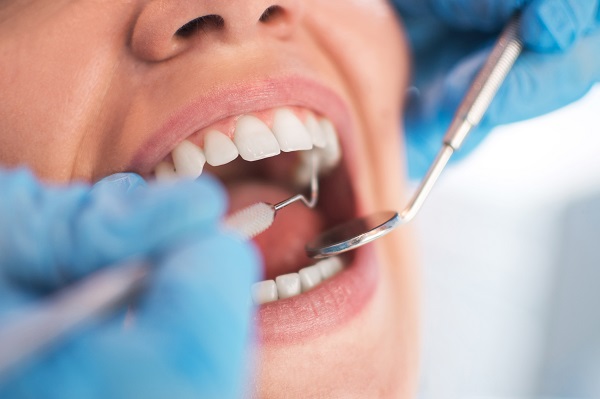What Happens During an Oral Cancer Screening?

Thinking about getting an oral cancer sceening? Oral cancer screenings are a very important part of general dental care as they ensure the health of patient's oral cavity. They involve a few steps that are typically painless. Understanding the process of an oral cancer screening can be helpful for patients who are not sure what to expect. Keep reading to learn more.
What goes on during an oral cancer screening?
Below is an outline of what to expect during an oral cancer screening.
The oral cancer screening process
An oral cancer screening will include three main parts:
- Physical examination of the oral cavity: The dentist will use a gloved hand to feel around the patient's mouth. The soft tissues and gumlines will be felt to check for lumps or bumps that may indicate a warning sign. The dentist will carefully perform this part to ensure there is nothing abnormal
- Visual examination of the oral cavity: The visual part of the oral cancer screening is similar to a check-up visit, however, it wil be much more detailed. The dentist will carefully inspect each tissue in the mouth, looking for any spots or patches that indicate oral cancer. Usually, the spots are red or white, however, some may be darker in color, such as brown or black
- Additional tests: Some oral cancer screenings include additional tests that rely on the use of dye or a laser. If the visual and physical part of the examination indicates anything slightly abnormal, the dentist may apply a dye to check for oral cancer. Additionally, a laser may be used to perform a biopsy, which tests for oral cancer cells
The steps listed above may vary per patient; however, for the most part, these are the general guidelines of an oral cancer screening.
Other things to know
It is important to know that some people are more prone to oral cancer than others, which may necessitate more frequent screenings. For example, individuals that smoke tobacco or consume a lot of alcohol are especially at risk. Additionally, those that have family genes of cancer may pose a higher risk. Individuals that are at higher risk should talk with the dentist to determine what preventive measures can be taken. The dentist may suggest frequent oral cancer screenings, extra oral hygiene, and avoiding super sun exposure.
Oral cancer is often treated with surgeries, medication, and sometimes chemotherapy, all of which are necessary in order to prevent the cancer from spreading to other parts of the body where it could get worse.
Ready to schedule an oral cancer screening?
Individuals that want more information on oral cancer screenings and what they entail can consult directly with a general dentist to learn more. The dentist can provide detailed information on the importance of screenings. Additionally, the dentist can answer questions and go over concerns about the process. Reach out today to find out more or to get scheduled for an appointment.
Request an appointment here: https://www.leixdental.com or call Leix Dental at (815) 604-6104 for an appointment in our Lakewood office.
Check out what others are saying about our dental services on Yelp: Oral Cancer Screening in Lakewood, IL.
Recent Posts
Oral cancer screenings are recommended to patients who are at a higher risk of the disease. While it is not always necessary, most dentists recommend regular oral cancer screenings to ensure any concerning signs are detected as early as possible for the most effective treatment possible. Although many people have heard about oral cancer, all too…
Gum disease is a progressive condition that is caused by oral bacteria. It occurs when bacteria get beneath gum tissues, infecting them. Inflammation occurs as the immune system tries to fight off the infection, leading to damage to the bone structures that support teeth and gum disease.The first stage of gum disease called gingivitis can…
Flossing is an important component of preventive dentistry. Flossing must always accompany daily brushing. This may seem insignificant. After all, it involves running a line of floss through the thin gaps of your teeth. Even so, flossing benefits your teeth. If you want to know how valuable flossing is for preventive dentistry, here are the…
A root canal treatment removes an infection inside a tooth while preserving the natural structure of the tooth. Tooth extraction, on the other hand, removes the entire tooth, which ends pain but leaves a gap that can affect speech, bite force, and alignment. While the dentist will always aim to preserve the natural tooth, the…


